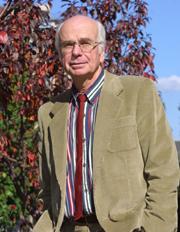
Professor Frank Müller
teaches “ecological economics.”
Photo by Andrew Dobrowolskyj
|
by
Frank Kuin
In some respects, Economics Professor Frank Müller is like a modern-day
Copernicus, the sixteenth- century Polish astronomer who tried to convince
people the earth revolved around the sun, and not the other way around.
Müller, who teaches ecological economics, has set himself a similar
task: to persuade people, especially in business and industry, that the
world economy is dependent upon the planet’s ecosystem, rather than
the environment being subservient to the economy.
Economy depends on ecosystem
Such a fundamental shift in attitude is needed in order to save the world’s
environment and promote sustainable development, he told the Thursday
Report. So long as the business community operates exclusively on
the basis of “very myopic goals,” it will be difficult to back
out of a “cul-de-sac” of industry-induced pollution and global
warming.
“Ultimately, the environment is determining the limitations in which
we conduct our economic activities,” said Müller, who serves
as president of the Canadian Society for Ecological Economics (CANSEE).
“But it is astonishing how difficult it seems even for the majority
of economists to understand that.
“In most of the textbooks, we see economics as an independent system.
This vision has to be changed. Economics is not independent. We are not
creating anything new, we are only transforming what already exists around
us — with all the environmental problems.”
In order for business to operate in a manner that’s environmentally
feasible, economists should become more tolerant of ideas from other disciplines,
such as ecology and biology. “Certain economic concepts are not adequate
to handle long-term problems, like global warming and climate change.”
To help that view, Müller recently chaired a conference on ecological
economics hosted by McGill’s School of Environment, titled Ecological
Sustainability of the Global Market Economy. Like-minded participants
from about 15 countries presented papers on a wide variety of topics,
from “green electricity” to “carbon credits.”
Next, Müller will try to bring ecological economics to “the
non-converted,” he said. In fact, Shell agreed to sponsor the conference,
which raised some eyebrows, but according to Müller, it is imperative
to engage corporations such as Shell and Exxon in the debate.
“It does not make sense to talk only to the converted, and not to
talk to your opponent,” he said. “Ultimately, we have to win
the battle by persuasion, through the industry. So what we have to do
is get out from our academia and into the boardrooms.”
Sound economics
The main challenge in getting a corporate ear for problems such as global
warming is the apparent contradiction between economy and ecology. There’s
“a mismatch” between the two, illustrated by their respective
timeframes, Müller said. “For economists, long-term is five
years. But for ecologists, five years is nothing.”
Still, the strongest argument in the ecological economist’s arsenal
may be economic merit. In the end, Müller said, corporations must
be persuaded that environmentally friendly policies can be sound economic
policies as well.
“Environmental policies should not be understood as slowing down
the economy. On the contrary, new industries are coming up, new environmental
products are emerging, new technologies are developed. So it’s pro-brain,
pro-investment, pro-innovation.” For example, the automobile industry
is investing billions of dollars to change engines and to get away from
the fossil-fuel-driven economy.
Müller, a self-described conventional economist by training, knows
not to expect quick progress. He has been involved in ecological economics
for almost 30 years, even before he joined Concordia in 1974. Problems
like global warming will be dealt with sooner or later, he said. “Environmental
issues stay with us permanently; there’s no way to escape them.”
|
|
|



